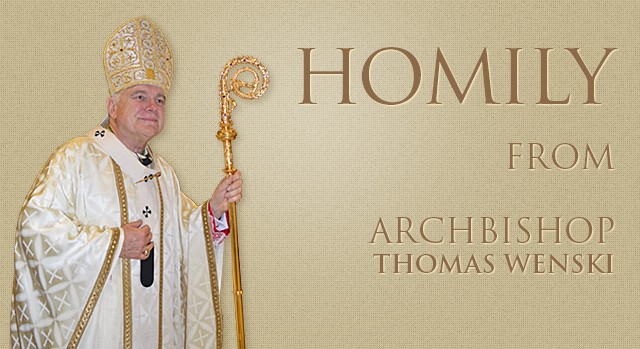By Archbishop Thomas Wenski - The Archdiocese of Miami
Archbishop Thomas Wenski preached this homily at the Mass of the Holy Spirit marking the start of a new academic year at St. John Vianney College Seminary in Miami, Aug. 27, 2018.
Today, we are increasingly addicted to “outrage” � in fact, the internet and cable news support a whole industry devoted to “outrage” � which could be defined as talk designed to provoke emotional responses � anger, fear, moral indignation among others. It is sustained by overgeneralization, sensationalism, inaccurate information and “ad hominem” attacks.
It is said that we live in an era of change; but perhaps it is more accurate to say that we are living through a change of an era. And one of the signs of our times is that all the institutions of society have been shaken. Positions of service are turned into instruments of personal gain. We see this in politics, we see this in academia, in the press, in the entertainment world, in business � and certainly we have seen this in the Church.
Because of corruption and greed, because of the abuse of authority and power, all these institutions have been undermined to one extent or another.
So it’s not surprising that this instability has spawned an “outrage industry” � and you’d think that there’s a contest for who will win the “most outraged” award.
Today, in Matthew’s Gospel, Jesus seems to be a bit “outraged” himself. Certainly, he wields a rhetorical sword against the scribes and Pharisees. But let’s not be too quick to put Jesus in the same category of those angry talking heads on cable TV or those bloggers that use “outrage” as click bait.
Jesus’ “woes” against the scribes and Pharisees are not to be lightly dismissed. But Jesus does not attack their persons or their group. Jesus doesn’t condemn people but behaviors and, in this case, he condemns a mentality that certainly “infected” those scribes and Pharisees but can also infect those of us in the Christian community to whom the words of the Gospel are addressed. St. Paul tells us that the Word of God is like a two-edged sword. It can cut to the quick � but the sword of God’s Word, like a surgeon’s scalpel, cuts not to harm but to heal.
Sin corrupts � and hypocrisy, pretending to be what one is not, corrupts the Church.
So those “woes” that Jesus hurls against corrupt religious leaders are also meant for us. In Matthew’s Gospel there are seven, but today we hear three of them (you’ll hear the rest in tomorrow’s Gospel reading).
“Woe to you, scribes and Pharisees, you hypocrites. You lock the Kingdom of heaven before men. You do not enter yourselves nor do you allow entrance to those trying to enter.”
Even if we’re not a Pharisee or scribe, we can by our behavior both block people’s access to Jesus and be far from him ourselves. Or, we may seek to convert people � not by preaching Jesus Christ and him crucified but by preaching ourselves or teaching false ideas or a false sense of security.
And you don’t have to be a televangelist raking in money from the poor and gullible for Jesus’ words to sting: “Blind fools, which is greater, the gold or the temple that made the gold sacred?” Rather than being “missionaries” too often we can succumb to the temptation of becoming “mercenaries”; and, instead of helping others, “we help ourselves.”
St. John Paul II told priests that the people look to them for the “word lived” before the “word proclaimed.” The days are long gone when what “Father said” or “What teacher said” was law. People today will not follow “blind guides” as Jesus described the Pharisees; but they will follow pastors whose authenticity is revealed in their transparency. When all is said and done, it is witness that convinces, not words. If we are witnesses, then as priests we can exercise our authority over our faithful without being authoritarian.
Gospel, of course, means “good news.” And we could ask whether the Scribes and Pharisees experienced Jesus’ words as “good news”? Perhaps not. But more importantly, do we experience the Gospel as “good news”? It can be � and it should be “good news,” in the measure we allow that double edged sword which is the Word of God to cut and heal us. Jesus even in his “hard sayings” is not in the “outrage industry.” He has come not to stoke our fears or incite our anger but to bring us to the fullness of life. May we always be in mind that, after the Gospel is read, the priest kisses the book and prays quietly: Through the words of the Gospel may our sins be wiped away.
As you begin this new academic year at St. John Vianney College Seminary, together with the generous people of the Archdiocese and the Province of Miami who support you by prayer and by their treasure, I assure you of my support. To be a priest is a great vocation. Your time here at the seminary is a time of discernment � that requires hard work, honesty with yourself and your spiritual director, it requires striving to grow closer to the Lord, working to equip yourselves to serve God’s people. And so, I make my own the words of St. Paul in today’s first reading: “We always pray for you, that our God may make your worthy of his calling and powerfully bring to fulfillment every good purpose and every effort of faith that the name of our Lord Jesus may be glorified in you, and you in him�.”

